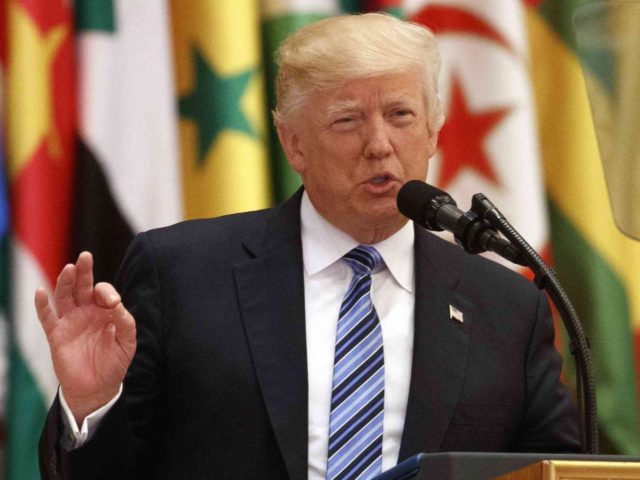President Donald Trump and President Barack Obama delivered addresses to the Muslim world at roughly the same point in their respective presidencies.
But unlike Obama, who attempted to appease Islamic resentment of the West by admitting America’s faults, Trump’s speech in Riyadh, Saudi Arabia on Sunday emphasized terrorism and challenged the Arab and Muslim world to foster peace by “honestly confronting the problem of Islamic extremism, and the Islamists, and Islamic terror of all kinds.”
The first difference between the two speeches was the setting. Trump addressed a summit of Arab and Muslim leaders at a conference to deal with terrorism. Obama, by contrast, invited members of the Muslim Brotherhood to his address at Al-Azhar University in Cairo.
Trump rallied the nations of the region to deal with a problem in their midst; Obama gave legitimacy to a banned group associated with terror and extremist ideology.
Obama began his address by focusing on western guilt:
More recently, tension has been fed by colonialism that denied rights and opportunities to many Muslims, and a Cold War in which Muslim-majority countries were too often treated as proxies without regard to their own aspirations. Moreover, the sweeping change brought by modernity and globalization led many Muslims to view the West as hostile to the traditions of Islam.
In contrast, Trump began by declaring that “Muslim countries must take the lead in combating radicalization. He said that he was not there to lecture to others about how to worship, but to call for unity “in pursuing the one goal: … to conquer extremism and vanquish the forces that terrorism brings with it every single time,” singling out “young Muslim men and women.”
Trump went further, taking on “terrorism and the ideology that drives it.” He listed recent terror attacks in the U.S. and around the world, and noted that “the deadliest toll has been extracted from the innocent people of Arab and Muslim nations.” The optimism of the region, he said, was “held at bay by bloodshed and terror.” And he added: “There can be no co-existence with this violence.”
Obama, too, had emphasized that many of the victims of groups like Al Qaeda were Muslim. Like Obama, Trump distanced terror from faith, suggesting terrorists falsely used the name of God, and implying that the problem was not limited to Islam, But Trump did not shy away from the link to Islam, whereas Obama sought to absolve Islam itself of any link with terrorism.
Obama said: “Islam is not part of the problem in combating violent extremism – it is an important part of promoting peace.” Obama never even used the word “terror.” He simply referred to “violence against civilians” by “extremists,” whom he never connected directly to Islam.
In contrast, Trump told the gathering in Saudi Arabia to “[d]rive them [terrorists] out from your places of worship,” and exhorted the nations present to make sure “terrorists find no sanctuary on their soil.”
Obama defended America to the Muslim world by emphasizing America’s connection to Islam — almost describing the U.S. as a Muslim nation itself. “[L]et there be no doubt: Islam is a part of America,” Obama declared. He cited exaggerated population figures for Muslims in the U.S.: “nearly seven million American Muslims in our country today,” he claimed.
Trump, in contrast, praised the achievements of the Arab and Muslim world in the region itself, but did not try to remake America in Islam’s image. Trump also spoke in a forthright manner about the persecution of Jews, whereas Obama irritated Israelis by claiming Israel was created because of the Holocaust.
Both presidents were gracious to their audience. Both downplayed the idea of interfering in the affairs of the Muslim world, unlike earlier administrations. Trump offered the Saudis the “friendship, and hope, and love” of the American people, and praised his hosts as the guardians of “the two holiest sites in the Islamic faith.” Trump also praised the arms deal he had reached with Saudi Arabia the day before, which he said would help both sides.
Obama was somewhat less focused on Egypt itself, but was effusive in his praise of Islam in general, crediting it — with some exaggeration — with making the European enlightenment possible, and with fostering religious tolerance.
Yet Trump was clear about the need to confront Iran as a common challenge to peace in the entire region. He even implied that regime change was an ultimate goal of U.S. policy toward Iran. Obama, in contrast, appeased Iran and accepted blame, publicly, for a “role in the overthrow of a democratically-elected Iranian government” in the 1950s.
Early media reports suggest that Trump’s speech is being described as “moderate,” because he did not use the signature phrase “radical Islamic terror.” That is not accurate: the principal objection to Obama’s evasion was the absence of the word “Islam,” which Trump addressed directly. But if that is indeed how the speech was received, then Trump achieved something great indeed: identifying the eradication of Islamic terror as a “moderate” value.
Joel B. Pollak is Senior Editor-at-Large at Breitbart News. He was named one of the “most influential” people in news media in 2016. He is the co-author of How Trump Won: The Inside Story of a Revolution, is available from Regnery. Follow him on Twitter at @joelpollak.

COMMENTS
Please let us know if you're having issues with commenting.